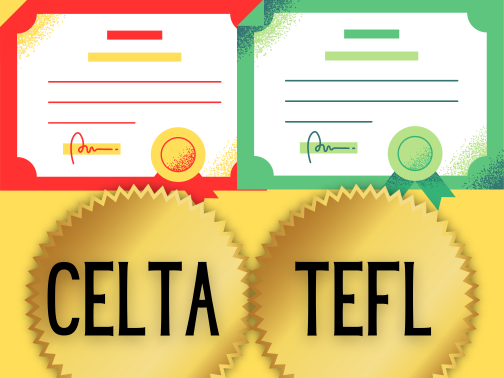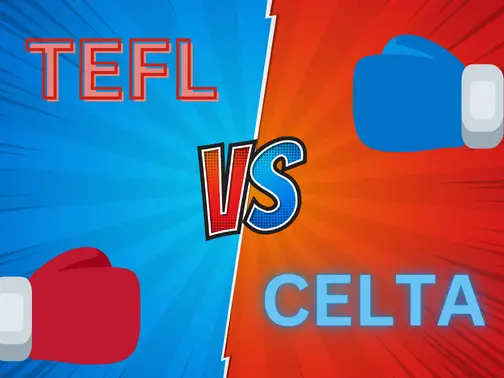Contents
Toggle
Meet Kurt Studer, a seasoned ESL expert and co-founder of Wonderful World English. With over a decade of teaching and managing language schools, Kurt provides cutting-edge teaching methodologies for new and experienced teachers.
Are you considering starting a career in teaching English as a Second Language (ESL), or are you looking to take your teaching career to the next level?
If you answered yes to either of the above, you’ve probably thought about which ESL qualification is the best one to pursue.
The two most renowned qualifications available for new and intermediate ESL teachers are the Certificate in English Language Teaching to Adults (CELTA) and Teaching English as a Foreign Language (TEFL).
A TEFL certificate is imperative to working in China and many other countries worldwide.
The greatest difference between CELTA and TEFL is that CELTA is more intensive and requires much more time to complete. This is because learners are required to observe, plan, and teach their own classes. As for many TEFL courses, the learner may only need to pass a written test or submit a single lesson plan to pass.
I obtained a TEFL certificate before arriving in China through Bridge TEFL.
Although I have not taken a CELTA course, it is similar to the DipTESOL I completed in 2019.
On top of this, many of my former and current colleagues are CELTA-qualified, including my wife, who is also an ESL teacher.
I will go into more detail about the differences between these two qualifications and help you better understand the pros and cons of each.
Let’s jump in!

What’s the Difference Between CELTA and TEFL?
CELTA and TEFL are both certifications that can qualify you to teach English as a foreign language.
Cambridge English Language Assessment offers CELTA, while TEFL is a generic term that refers to any certification that prepares you to teach ESL.
The CELTA is accredited as a Level 5 on the UK’s Regulated Qualifications Framework (RQF).
This means it is the equivalent of two years of study at the undergraduate level, similar to an associate’s degree in the USA.
Level 5 TEFL courses are out there, but that means they are not interchangeable and will likely cover different content than the CELTA.
A level 5 TEFL course and CELTA are both level 5 qualifications, but that only means they’re the same level of difficulty, not that the qualifications are interchangeable. The method of delivery and content of the two qualifications is actually very different.
TEFL.org
In comparison, a DELTA is a Level 7 on the RQF, equivalent to a master’s degree.
Having a DELTA may also count toward one to two college credit classes for a master’s degree program in the UK.

1. CELTA vs. TEFL: The Difference
Several distinctions separate a CELTA from a TEFL.
Below are the significant differences between these two qualifications:
– Certification
CELTA is a certification that is widely respected and acknowledged globally.
It is generally considered a more prestigious certification compared to TEFL.
According to Cambridge, three-quarters of language teaching jobs require a CELTA.
TEFL is a generic term that can refer to any number of certifications, none of which are as highly regarded as CELTA.
– Content
The course content for CELTA and TEFL differs.
CELTA courses are standardized and cover a set curriculum.
CELTA courses cover the following topics:
- Learners, teachers, and the teaching and learning environment.
- Language analysis and awareness.
- Language skills development: reading, listening, speaking, and writing.
- Planning and creating resources for diverse teaching contexts.
- Enhancing teaching skills and professionalism.

By taking a CELTA course, you will graduate with a strong understanding of structuring your classes to achieve set goals.
It will also teach you how to choose activities that maximize students’ application of the “big four skills” (reading, listening, speaking, and writing).
TEFL courses can vary in content, and the quality of the course will depend on the provider.
In my experience, you will generally encounter key terms related to teaching ESL, such as elicitation and error correction.
Although you will likely lack the opportunity to apply these in a classroom (unless you are currently teaching as you complete the course).

– Duration
CELTA courses have intense (generally four weeks) and non-intense (up to 6 months) options for students, depending on their chosen provider.
The courses are 120 hours.
Unless you are in a hurry to obtain the qualification, I recommend the non-intense option (especially if you are a new teacher).
Planning classes that will pass the rater’s requirements can take much time and effort.
Both of my brothers have a CELTA qualification.
One of them was an experienced ESL teacher when he started his CELTA, and the other brother had never taught a class when he began his.
The experienced brother worked hard but passed with little stress.
The inexperienced brother did not experience the same smooth ride.
Let me put it another way; he even began temporarily smoking again until he completed the course!
Now, for TEFL courses, they can vary in duration from a few weeks to several months.
They are not as intense as the CELTA, although they still offer 120 to 240-hour options.
While completing my own TEFL certificate, I was able to complete the course and pass the final test in just a fraction of the time.
Have you ever wondered whether having a TEFL means an ESL teacher will get paid more?
Find out the truth in the article below!
Related Article: Do TEFL Teachers Get Paid More Than Non-TEFL Teachers?

– Delivery
CELTA courses used to be typically delivered in person but now have many online options through different providers.
There are over 2,800 centres in 130 countries around the world.
Cambridgeenglish.org
TEFL courses can be delivered in person or online but are typically completed asynchronously online with minimal face-to-face meetings.
Some providers now offer blended courses with a mix of online and offline classroom practice, so keep your eyes open as you can’t beat real in-classroom experience for becoming a better teacher!
– Cost
CELTA courses are generally more expensive than TEFL courses and average about $2,000, depending on where you live.
Click here to compare CELTA prices around the world.
However, CELTA is a more prestigious certification and can lead to better job opportunities and much higher salaries.
TEFL Certificates can range from $150 to $1500 depending on the number of hours you take and if there is a face-to-face component.

– Opportunities
CELTA is recognized worldwide and can lead to better job opportunities in higher-paying markets.
TEFL, on the other hand, may be sufficient for jobs in lower-paying markets.
Having a TEFL allowed me to get my first teaching job in China and teach in different cities.
TEFL even let me obtain a managerial position before I acquired a higher level of certification seven years later.
Are you considering starting a new career in ESL?
Find out more about why teaching ESL could be an excellent choice for you in the article below.
Related Article: Why Become an ESL Teacher? – Teacher’s Top Reasons

2. CELTA vs. TEFL: Pros and Cons
Now we’ve covered the significant differences between these two qualifications, let’s take a look at the pros and cons that come with each:
CELTA Pros:

- Internationally recognized.
- It equips trainees with practical teaching skills.
- Suitable for people with little or no teaching experience.
- Offers a solid foundation for English language teaching.
- A requirement for many higher-level teaching positions
CELTA Cons:

- It is expensive.
- Intensive course with a high workload.
- Limited to teaching adults.
- Limited flexibility in course length and schedule (although this is improving).
TEFL Pros:

- Wide range of course options and providers available.
- Suitable for a variety of teaching contexts.
- Less expensive than CELTA.
- It can be completed online or in person.
- Provides basic training in English language teaching.

TEFL Cons:

- Not as widely recognized as CELTA.
- Limited practical teaching experience.
- Varying quality of courses and providers.
- Less suitable for higher-level teaching positions.
These are just some of the basic pros and cons of each certificate.
To learn more about the differences between CELTA, TEFL, and TESOL certifications, check out the guide below!
Related Article: CELTA vs. TEFL vs. TESOL: Which One is Best?

Conclusion
Ultimately, the best certification for a person depends on their goals and circumstances.
If you are already an experienced ESL teacher or see yourself teaching English for many years and want to gain a solid foundation in English language teaching, then CELTA is the better choice.
If you are looking at getting your foot in the door but may not want to pursue a long-term career in ESL, TEFL is a good option.
You may find yourself like me; I only planned on teaching for a few years before moving on.
My passion for teaching English transformed into a long-term career as I progressed from obtaining a TEFL certification to achieving a DipTESOL and, eventually, an M.A. TESOL degree, all while experiencing the joy of being in the classroom and guiding my students.
I hope this helps you better understand these two certifications’ differences and aids you on your journey.
Image Attribution: All images licensed via canva.com





